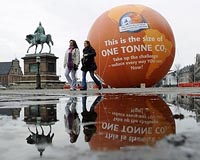| . |  |
. |
Cancun, Mexico (AFP) Nov 26, 2010 Following is a snapshot of scientific opinion on climate change ahead of the November 29-December 10 UN climate conference in Cancun, Mexico. - Evidence for global warming is now unequivocal. There is a more than 90-percent probability that humans are the cause, mainly through "greenhouse" gases emitted by burning coal, oil and gas. These invisible carbon gases trap solar heat, thus warming up the atmosphere, land mass and oceans. - Concentrations of carbon dioxide (CO2), the main greenhouse gas, reached 386.8 parts per million in 2009, up 38 percent from pre-industrial times. They are now at their highest in 650,000 years. CO2 has a strong inertial effect, meaning that emissions today will have an effect for centuries to come. - Since 1900, the mean global atmospheric temperature has risen by 0.8 C (1.44 F) and the sea level by 10-20 centimetres (four to eight inches). The past decade was the warmest on record. - Climate change is already visible, in the loss of alpine glaciers and snow cover, shrinking Arctic summer sea ice and thawing permafrost, changes in rainfall patterns, leading to flood and drought in many regions, and rising ocean temperatures. - By 2100, global average surface temperatures could rise by between 1.1 C and 6.4 C (1.98 and 11.52 F) compared to 1980-99 levels. Within this range, common "best estimates" run from 2.4 C (4.3 F) for a scenario based on a major switch to non-fossil fuels to 4.0 C (7.8 F) for a fossil-fuel intensive economy. - Intensifying water stress, dwindling agricultural yields and biodiversity, worse flooding from rainstorms and rising seas are among the potential impacts, depending on temperature rise. Mortality due to diseases associated with floods and droughts will increase. Tropical storms could become more vicious and/or more frequent. - Scientists are also worried about several major unknowns in the climate equation. These include meltwater from the Antarctic and Greenland icesheets, which will affect sea levels, and "positive feedbacks," such as the release of methane trapped in Arctic latitudes, that could radically amplify warming. - There is no consensus on what is considered a safe level of warming. To have a good chance of limiting it to 2C (3.6F), global emissions of greenhouse gases need to peak by 2020 at the latest, be more than halved by 2050 compared with their 1990 and continue to decline thereafter. - The 2009 "Copenhagen Accord" set the target of limiting warming to 2C, but without specifying a roadmap for reaching it or making emissions pledges legally binding. According to an estimate by German scientists, current pledges mean there is a more-than 50 percent chance that warming will exceed 3 C (5.4 F) by 2100. SOURCES: Intergovernmental Panel on Climate Change (IPCC) 4th Assessment Report (2007); World Meteorological Organisation (2010); estimates by Potsdam Institute for Climate Impact Research, Climate Analytics and Ecofys.
Share This Article With Planet Earth
Related Links Climate Science News - Modeling, Mitigation Adaptation
 UN body warns Copenhagen climate targets could be missed
UN body warns Copenhagen climate targets could be missedHelsinki (AFP) Nov 23, 2010 The Copenhagen accord targets to cut global warming will be missed unless next week's climate change conference transforms promises into action, the United Nations Environment Programme (UNEP) said Tuesday. Representatives from 194 countries meet in the Mexican resort city of Cancun from November 29 to December 10 for a new bid to strike a deal to curb greenhouse gases following on last Dece ... read more |
|
| The content herein, unless otherwise known to be public domain, are Copyright 1995-2010 - SpaceDaily. AFP and UPI Wire Stories are copyright Agence France-Presse and United Press International. ESA Portal Reports are copyright European Space Agency. All NASA sourced material is public domain. Additional copyrights may apply in whole or part to other bona fide parties. Advertising does not imply endorsement,agreement or approval of any opinions, statements or information provided by SpaceDaily on any Web page published or hosted by SpaceDaily. Privacy Statement |